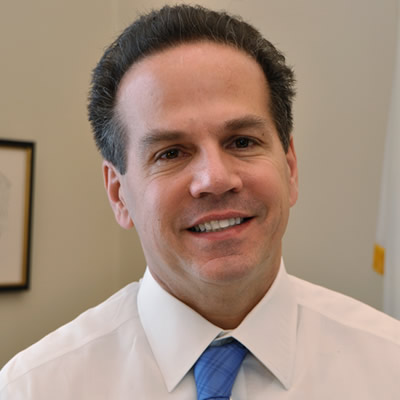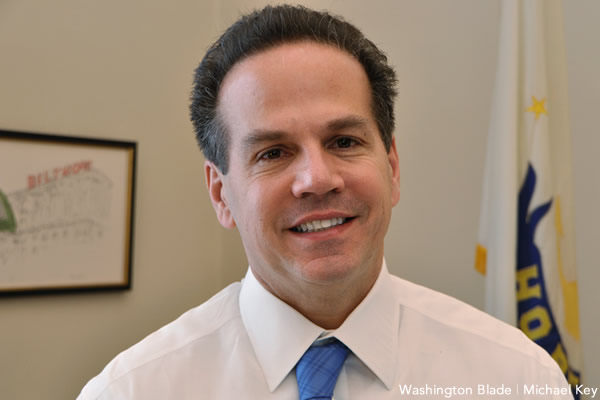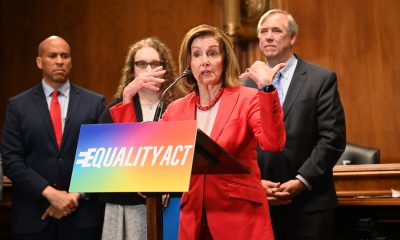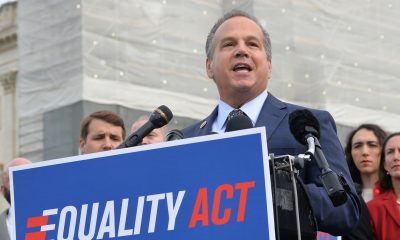National
Cicilline fends off challenger in R.I. primary
Election results yield mixed bag for marriage equality prospects


Gay Rep. David Cicilline defeated his challenger in the Rhode Island Democratic primary on Tuesday. (Blade file photo by Michael Key)
Gay Rep. David Cicilline (D-R.I.) defeated his challenger, businessman Anthony Gemma, to win the Democratic nomination to continue to represent Rhode Island’s 1st congressional district in the U.S. House in Tuesday’s primary.
Local media outlets called the race for Cicilline about an hour after polls closed at 8 p.m. in Rhode Island. With 98 percent of precincts reporting, Cicilline held 61 percent of the vote, compared to the 31 percent claimed by Gemma and 8 percent won by another candidate, Chris Young.
Cicilline faced criticism during the race — even though he’s running in a overwhelmingly “blue” state — as a result of financial difficulties facing the city of Providence, R.I., where Cicilline served as mayor before running for Congress.
A report commissioned by the City Council last year blamed Cicilline’s administration for a lack of transparency and for making a series of moves – like tapping into Providence’s rainy-day fund – without councilors’ approval. The lawmaker apologized in April, saying he should have been more forthright about the financial condition of the city.
Still, Cicilline retained support heading into the primary. The lawmaker was once again endorsed by the Gay & Lesbian Victory Fund. In new campaign ads, former U.S. Rep. Patrick Kennedy, who once held the seat now held by Cicilline, vouched for the out lawmaker’s commitment to public service.
Sexual orientation did come into play during the Democratic primary. According to the Associated Press, Anthony Sionni, an unpaid campaign staffer for the Gemma campaign, compared the openly gay lawmaker on Twitter to convicted child molester and former Penn State coach Jerry Sandusky, saying there’s “nothing wrong with smearing a liar, thief, crook, Sandusky copy cat.” The state Democratic Party had called for Gemma to fire Anthony Sionni, apologize to Cicilline and disavow the message. In response, a Gemma campaign spokesperson reportedly said the tweet was “inappropriate” and Sionni agreed to leave the campaign.
Cicilline was running against a primary opponent who largely self-financed his campaign. According to Federal Election Commission reports, 80 percent of the $315,000 that Gemma raised was from him contributing or lending his money to his own campaign. In comparison, all the $1.7 million that Cicilline raised for his campaign was the result of outside contributions.
But Cicilline isn’t out of the woods in his bid to retain his U.S. House seat. He’s facing a challenge in the general election from Republican Brendan Doherty, a retired high-ranking police officer and former superintendent of Rhode Island’s Department of Public Safety.
According to a poll published by Rhode Island’s WPRI late last month, 52 percent of Gemma supporters said they’d back Doherty in the general election if the Democratic challenger lost the primary. Compared to the $1.7 million that Cicilline has raised, Doherty has $1.1 million in total net receipts. About five percent, or $50,000, of Doherty’s net receipts are from self-financing.
Chuck Wolfe, the Victory Fund’s CEO, said the choice is clear on LGBT issues heading into the general election because Doherty supports the Defense of Marriage Act, an anti-gay law that prohibits federal recognition of same-sex marriage.
“We’re pleased that Rhode Island Democrats have once again chosen David Cicilline to represent them in Congress,” Wolfe said. “Now voters will face a clear choice this November between a persistent champion for LGBT equality, and an opponent who supports the Defense of Marriage Act, which makes life harder for so many American families.”
The Victory Fund is citing the website Electful.com, which keeps track of candidates’ positions on issues, as the source for Doherty’s support for DOMA. On the other hand, Cicilline is an original co-sponsor of DOMA repeal legislation known as the Respect for Marriage Act.
The Democratic primary produced mixed results in terms of electing candidates who support marriage equality. One lesbian candidate, Laura Pisaturo, narrowly lost her bid to unseat a Democratic lawmaker who opposes same-sex marriage.
Many incumbent Democrats who support marriage equality fended off challenges from candidates who oppose it. Among those incumbents were State Sen. Ryan Pearson, State Rep. Arthur Handy, State Rep. Greg Amore, State Rep. Joseph Almeida, and State House Majority Whip Patrick O’Neill.
But in primaries in which pro-marriage equality challengers were running against incumbent Democrats who oppose it, the pro-LGBT side only won a single primary. Democrat Adam Satchell, a teacher and proponent of marriage equality, beat an incumbent Democrat who opposes same-sex marriage, State Sen. Michael Pinga.
Still, the outcome means a net gain of one vote in the State Senate at a time when legislation to enact same-sex marriage in the Ocean State is expected to advance next year.
In a competitive primary in State Senate District 29, incumbent State Sen. Michael McCaffrey, an opponent of marriage equality, won against Pisaturo, who was endorsed by the Victory Fund. McCaffrey had a narrow win against Pisaturo, taking 53 percent of the vote compared to Pisaturo’s 47 percent.
McCaffrey, chairs Rhode Island’s Senate Judiciary Committee, and, even though he’s a Democrat, has never allowed pending same-sex marriage legislation to advance in his committee. During a TV debate last month, McCaffrey said he “believes that marriage is between a man and a woman.”
Ray Sullivan, campaign director of Marriage Equality Rhode Island, said his organization is “incredibly proud” of the campaign Pisaturo waged despite her loss.
“We’re proud to have been a part of it,” Sullivan added. “She talked about issues that were important to people in that district, and if we had it to do all over again, we would absolutely stand with her.”
Asked whether marriage equality legislation can still advance, Sullivan said he intends to take McCaffrey “at his word” when the Democrat said during an earlier debate he’ll allow a vote on same-sex legislation in his committee despite his opposition to same-sex marriage.
“When we win a number of these races in the general election and we elect a pro-equality majority in the Senate in the general election, we expect Sen. McCaffrey to honor that commitment, and we look forward to scheduling a committee vote on marriage equality in the Senate Judiciary Committee,” Sullivan said.
In an interview with Washington Blade last week during the Democratic National Convention, Rhode Island Gov. Lincoln Chafee, a supporter of marriage equality, said the election of Pisaturo would be “pivotal” in determining whether same-sex marriage legislation would be able to advance in the Rhode Island legislature.
Other Senate races had disappointing outcomes for marriage equality proponents. Same-sex marriage opponent State Sen. Marc Cote won his primary against challenger Lewis Pryeor, who supports same-sex marriage. Similarly, marriage equality opponent State Sen. Daniel DaPonte won over challenger and marriage equality supporter Roberto DaSilva.
One race in which there was no incumbent also yielded a loss for marriage equality supporters. In State Senate District 26, Gene Dyszlewski, who supports marriage equality, lost to Frank Lombardi, who opposes same-sex marriage.
In State Senate District 33, David Gorman, a Democratic supporter of marriage equality, lost to Leonidas Raptakis, a Democratic opponent of gay nuptials. But the result in that race is a wash in that district because the incumbent Republican, State Sen. Glenford Shibley, opposes marriage equality.
According to WPRI, a group known as People for Rhode Island’s Future spent $26,500 earlier this month to elect six pro-marriage equality candidates in the Democratic primary. That group reportedly received a $20,000 donation to make that happen from Tim Gill, a gay Denver-based entrepreneur and philanthropist known for working to advance marriage equality, as well as $15,000 from Esmond Harmsworth, a Newport, R.I., resident and founding partner of Boston literary agency Zachary Shuster Harmsworth Literary Agency.
Pennsylvania
Malcolm Kenyatta could become the first LGBTQ statewide elected official in Pa.
State lawmaker a prominent Biden-Harris 2024 reelection campaign surrogate

Following his win in the Democratic primary contest on Wednesday, Pennsylvania state Rep. Malcolm Kenyatta, who is running for auditor general, is positioned to potentially become the first openly LGBTQ elected official serving the commonwealth.
In a statement celebrating his victory, LGBTQ+ Victory Fund President Annise Parker said, “Pennsylvanians trust Malcolm Kenyatta to be their watchdog as auditor general because that’s exactly what he’s been as a legislator.”
“LGBTQ+ Victory Fund is all in for Malcolm, because we know he has the experience to win this race and carry on his fight for students, seniors and workers as Pennsylvania’s auditor general,” she said.
Parker added, “LGBTQ+ Americans are severely underrepresented in public office and the numbers are even worse for Black LGBTQ+ representation. I look forward to doing everything I can to mobilize LGBTQ+ Pennsylvanians and our allies to get out and vote for Malcolm this November so we can make history.”
In April 2023, Kenyatta was appointed by the White House to serve as director of the Presidential Advisory Commission on Advancing Educational Equity, Excellence and Economic Opportunity for Black Americans.
He has been an active surrogate in the Biden-Harris 2024 reelection campaign.
The White House
White House debuts action plan targeting pollutants in drinking water
Same-sex couples face higher risk from environmental hazards

Headlining an Earth Day event in Northern Virginia’s Prince William Forest on Monday, President Joe Biden announced the disbursement of $7 billion in new grants for solar projects and warned of his Republican opponent’s plans to roll back the progress his administration has made toward addressing the harms of climate change.
The administration has led more than 500 programs geared toward communities most impacted by health and safety hazards like pollution and extreme weather events.
In a statement to the Washington Blade on Wednesday, Brenda Mallory, chair of the White House Council on Environmental Quality, said, “President Biden is leading the most ambitious climate, conservation, and environmental justice agenda in history — and that means working toward a future where all people can breathe clean air, drink clean water, and live in a healthy community.”
“This Earth Week, the Biden-Harris Administration announced $7 billion in solar energy projects for over 900,000 households in disadvantaged communities while creating hundreds of thousands of clean energy jobs, which are being made more accessible by the American Climate Corps,” she said. “President Biden is delivering on his promise to help protect all communities from the impacts of climate change — including the LGBTQI+ community — and that we leave no community behind as we build an equitable and inclusive clean energy economy for all.”
Recent milestones in the administration’s climate policies include the U.S. Environmental Protection Agency’s issuance on April 10 of legally enforceable standard for detecting and treating drinking water contaminated with polyfluoroalkyl substances.
“This rule sets health safeguards and will require public water systems to monitor and reduce the levels of PFAS in our nation’s drinking water, and notify the public of any exceedances of those levels,” according to a White House fact sheet. “The rule sets drinking water limits for five individual PFAS, including the most frequently found PFOA and PFOS.”
The move is expected to protect 100 million Americans from exposure to the “forever chemicals,” which have been linked to severe health problems including cancers, liver and heart damage, and developmental impacts in children.
An interactive dashboard from the United States Geological Survey shows the concentrations of polyfluoroalkyl substances in tapwater are highest in urban areas with dense populations, including cities like New York and Los Angeles.
During Biden’s tenure, the federal government has launched more than 500 programs that are geared toward investing in the communities most impacted by climate change, whether the harms may arise from chemical pollutants, extreme weather events, or other causes.
New research by the Williams Institute at the UCLA School of Law found that because LGBTQ Americans are likelier to live in coastal areas and densely populated cities, households with same-sex couples are likelier to experience the adverse effects of climate change.
The report notes that previous research, including a study that used “national Census data on same-sex households by census tract combined with data on hazardous air pollutants (HAPs) from the National Air Toxics Assessment” to model “the relationship between same-sex households and risk of cancer and respiratory illness” found “that higher prevalence of same-sex households is associated with higher risks for these diseases.”
“Climate change action plans at federal, state, and local levels, including disaster preparedness, response, and recovery plans, must be inclusive and address the specific needs and vulnerabilities facing LGBT people,” the Williams Institute wrote.
With respect to polyfluoroalkyl substances, the EPA’s adoption of new standards follows other federal actions undertaken during the Biden-Harris administration to protect firefighters and healthcare workers, test for and clean up pollution, and phase out or reduce use of the chemicals in fire suppressants, food packaging, and federal procurement.
Maine
Maine governor signs transgender, abortion sanctuary bill into law
Bomb threats made against lawmakers before measure’s passage

BY ERIN REED | On Tuesday, Maine Gov. Janet Mills signed LD 227, a sanctuary bill that protects transgender and abortion providers and patients from out-of-state prosecution, into law.
With this action, Maine becomes the 16th state to explicitly protect trans and abortion care in state law from prosecution. This follows several bomb threats targeting state legislators after social media attacks from far-right anti-trans influencers such as Riley Gaines and Chaya Raichik of Libs of TikTok.
An earlier version of the bill failed in committee after similar attacks in January. Undeterred, Democrats reconvened and added additional protections to the bill before it was passed into law.
The law is extensive. It asserts that gender-affirming care and reproductive health care are “legal rights” in Maine. It states that criminal and civil actions against providers and patients are not enforceable if the provision or access to that care occurred within Maine’s borders, asserting jurisdiction over those matters.
It bars cooperation with out-of-state subpoenas and arrest warrants for gender-affirming care and abortion that happen within the state. It even protects doctors who provide gender-affirming care and abortion from certain adverse actions by medical boards, malpractice insurance, and other regulating entities, shielding those providers from attempts to economically harm them through out-of-state legislation designed to dissuade them from providing care.
You can see the findings section of the bill here:
The bill also explicitly enshrines the World Professional Association of Transgender Health’s Standards of Care, which have been the target of right-wing disinformation campaigns, into state law for the coverage of trans healthcare:
The bill is said to be necessary due to attempts to prosecute doctors and seek information from patients across state lines. In recent months, attorneys general in other states have attempted to obtain health care data on trans patients who traveled to obtain care. According to the U.S. Senate Finance Committee, attorneys general in Tennessee, Indiana, Missouri, and Texas attempted to obtain detailed medical records “to terrorize transgender teens in their states … opening the door to criminalizing women’s private reproductive health care choices.”
The most blatant of these attempts was from the attorney general of Texas, who, according to the Senate Finance Committee, “sent demands to at least two non-Texas entities.” One of these entities was Seattle Children’s Hospital, which received a letter threatening administrators with arrest unless they sent data on Texas patients traveling to Seattle to obtain gender-affirming care.
Seattle Children’s Hospital settled that case out of court this week, agreeing to withdraw its Texas business registration in return for Texas dropping its investigation. This likely will have no impact on Seattle Children’s Hospital, which has stated it did not treat any youth via telemedicine or in person in Texas; the hospital will be able to continue treating Texas youth who travel outside of Texas to obtain their care. That settlement was likely compelling due to a nearly identical law in Washington that barred out-of-state investigations on trans care obtained solely in the state of Washington.
The bill has faced a rocky road to passage. A similar bill was debated in January, but after coming under intense attack from anti-trans activists who misleadingly called it a “transgender trafficking bill,” the bill was voluntarily withdrawn by its sponsor.
When LD 227 was introduced, it faced even more attacks from Gaines and Libs of TikTok. These attacks were followed by bomb threats that forced the evacuation of the legislature, promising “death to pedophiles” and stating that a bomb would detonate within a few hours in the capitol building.
Despite these threats, legislators strengthened both the abortion and gender-affirming care provisions and pressed forward, passing the bill into law. Provisions found in the new bill include protecting people who “aid and assist” gender-affirming care and abortion, protections against court orders from other states for care obtained in Maine, and even protections against adverse actions by health insurance and malpractice insurance providers, which have been recent targets of out-of-state legislation aimed at financially discouraging doctors from providing gender-affirming care and abortion care even in states where it is legal.
See a few of the extensive health insurance and malpractice provisions here:
Speaking about the bill, Gia Drew, executive director of Equality Maine, said in a statement, “We are thrilled to see LD 227, the shield bill, be signed into law by Gov. Mills. Thanks to our pro equality and pro reproductive choice elected officials who refused to back down in the face of disinformation. This bill couldn’t come into effect at a better time, as more than 40 percent of states across the country have either banned or attempted to block access to reproductive care, which includes abortions, as well as transgender healthcare for minors. Thanks to our coalition partners who worked tirelessly to phone bank, lobby, and get this bill over the finish line to protect community health.”
Destie Hohman Sprague of the Maine Women’s Lobby celebrated the passage of the bill despite threats of violence, saying in a statement, “A gender-just Maine ensures that all Mainers have access to quality health care that supports their mental and physical wellbeing and bodily autonomy, including comprehensive reproductive and gender-affirming care. We celebrate the passage of LD 227, which helps us meet that goal. Still, the patterns of violence and disinformation ahead of the vote reflected the growing connections between misogyny, extremism, and anti-democratic threats and actions. We must continue to advocate for policies that protect bodily autonomy, and push back against extremist rhetoric that threatens our states’ rights and our citizens’ freedoms.”
The decision to pass the legislation comes as the Biden administration released updated HIPAA protections that protect “reproductive health care” from out-of-state prosecutions and investigations.
Although the definition of “reproductive health care” is broad in the new HIPAA regulations, it is uncertain whether they will include gender-affirming care. For at least 16 states, though, gender-affirming care is now explicitly protected by state law and shielded from out-of-state legislation, providing trans people and those seeking abortions with protections as the fight increasingly crosses state lines.
****************************************************************************

Erin Reed is a transgender woman (she/her pronouns) and researcher who tracks anti-LGBTQ+ legislation around the world and helps people become better advocates for their queer family, friends, colleagues, and community. Reed also is a social media consultant and public speaker.
******************************************************************************************
The preceding article was first published at Erin In The Morning and is republished with permission.
-

 State Department3 days ago
State Department3 days agoState Department releases annual human rights report
-

 Maryland4 days ago
Maryland4 days agoJoe Vogel campaign holds ‘Big Gay Canvass Kickoff’
-

 Politics3 days ago
Politics3 days agoSmithsonian staff concerned about future of LGBTQ programming amid GOP scrutiny
-

 The White House2 days ago
The White House2 days agoWhite House debuts action plan targeting pollutants in drinking water














